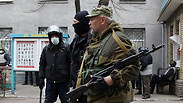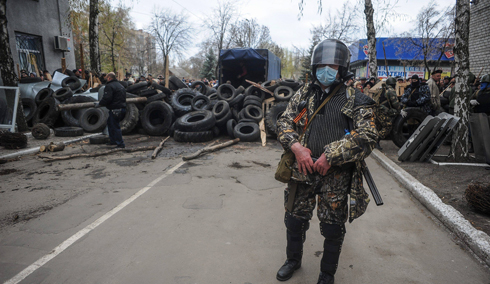
British Prime Minister David Cameron and German Chancellor Angela Merkel on Monday called on Russia to unequivocally condemn the occupation of government buildings in eastern Ukraine.
The two leaders spoke by phone on Monday to discuss escalating tensions and the threat of Ukrainian military action following the occupation of state buildings in the east of Ukraine by pro-Russian separatists.
Related stories:
- Ukraine to deploy troops in anti-terror operation
- Israel must stay out of Ukraine crisis
- Putin exercising caution in Ukraine crisis
"He and Chancellor Merkel agreed about the importance of condemning the illegal occupation of government buildings in eastern Ukraine," Cameron's official spokesman told reporters. "They believe the Russian government should be unequivocally condemning that action too."
Cameron is due to speak to French President Francois Hollande about Ukraine later Monday, said the spokesman.
The United Nations Security Council met late Sunday in emergency session as violence escalated in eastern Ukraine, hours before a Monday morning deadline for pro-Russia protesters to lay down their arms or face Ukrainian troops.

Russia called the meeting shortly after Ukrainian Special Forces exchanged gunfire Sunday with a pro-Russia militia in an eastern city, and at least one security officer was killed and five others wounded. Ukraine's president accused its powerful neighbor of fomenting unrest, and announced that his government would deploy armed forces Monday to quash an increasingly bold pro-Russian insurgency.
"At this moment, Ukraine teeters on the brink," Assistant UN Secretary-General Oscar Fernandez-Taranco told Security Council members.
Ethnic Russians in Ukraine's east fear that the country's new pro-Western government will oppress them, and are demanding to have referendums on autonomy and possible annexation by Russia.
Fernandez-Taranco said UN monitors in eastern Ukraine have described seeing pro-separatist protesters as being armed with machine guns and sniper rifles.
"The fact is that many of the armed units that we've seen were outfitted in bulletproof vests, camouflage uniforms with insignia removed," US Ambassador Samantha Power said. "These armed units ... raised Russian and separatist flags over seized buildings and have called for referendums and union with Russia. We know who is behind this."
Russia has tens of thousands of troops massed along Ukraine's eastern border, and there are fears that Moscow might use the violence in the mainly Russian-speaking region as a pretext for an invasion, in a repeat of events in Crimea weeks ago.
Threatening Sanctions
The US was prepared to step up sanctions against Moscow if pro-Russian military actions in eastern Ukraine continue, a senior American envoy said Sunday.
The next round of US sanctions, which would be the fourth imposed since the Ukraine crisis began, is likely to target Russians close to Putin as well as Russian entities, three sources familiar with the discussions said on Sunday.
However, they will not necessarily target entire Russian business sectors such as mining, banking and energy, the sources said, adding that the situation was fluid.
"Broad sectoral sanctions are probably not up for immediate action. What is up for immediate action is ... (Russian) individuals and entities," said one of the sources. "All of this is subject to what is happening on the ground."
Even if the United States were to target swathes of Russian industry, US officials said it was uncertain whether Europe would go along with penalties that would affect Russia's economy and powerful energy sector.
Samantha Power, said on ABC's "This Week" that the latest events in Ukraine bore "the telltale signs of Moscow's involvement."
"The president has made clear that, depending on Russian behavior, sectoral sanctions in energy, banking, mining could be on the table, and there's a lot in between," Power said.
"I think we've seen that the sanctions can bite, and if actions like the kind we've seen over the last few days continue, you're going to see a ramping up of those sanctions."
"This is not a war between Ukrainians, this was artificially created," said Ukraine's UN Ambassador Yuriy Sergeyev.
Russian Ambassador Vitaly Churkin denied Western and Ukrainian claims that Moscow was behind the violence, and told UN diplomats that Ukraine has been using radical neo-Nazi forces to destabilize its eastern region.
"It is the West that will determine the opportunity to avoid civil war in Ukraine. Some people, including in this chamber, do not want to see the real reasons for what is happening in Ukraine and are constantly seeing the hand of Moscow in what is going on," Churkin said. "Enough. That is enough."
He said after the meeting that he hoped Western powers would pressure Ukraine to rethink its deadline for sending in troops.
"Whether they are going to put an end to this provocation by Kiev, this is their responsibility to prevent further escalation of this crisis," Churkin said.















